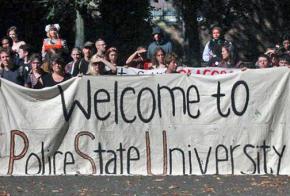Keep the guns away from campus cops
reports on protests against the militarization of PSU campus police.
ACTIVISTS DISRUPTED Portland State University (PSU) President Wim Wiewel's speech at the freshman convocation on September 21 to protest university plans to militarize the campus police.
This is the first action of the #DisarmPSU campaign, as activists focus attention on the problem of racist police violence in Portland, Oregon, and the undemocratic way that the PSU Board of Trustees decided to begin arming the campus police.
Protesters unfurled banners and interrupted Wiewel's speech with a people's mic, sending the messages "Black Lives Matter" and "Disarm PSU," and inviting students to join a protest outside. Some 50 people took part in the rally and march that followed.
Students, faculty, staff and Portland community members began organizing last year in opposition to plans by to arm the Campus Public Safety Office (CPSO). Throughout the 2014-15 academic year, the PSU Student Union participated in all available public forums in order to challenge the police policy, while also engaging in protest actions.

Despite the opposition, last spring, the PSU Board of Trustees voted to arm and deputize campus security. Now activists are stepping up their organizing.
The shooting of unarmed Black driver Sam Dubose by a campus police officer at the University of Cincinnati (UC) this summer revealed to the world the deadly results of arming campus police. Officer Ray Tensing, who had a history of pulling over Black motorists for minor traffic violations, stopped Dubose in July a mile from campus for a missing license plate. The officer shot Dubose in the head while Dubose was sitting in his car, killing him within minutes of the stop.
Since 1997, UC police have killed four people during altercations, all of them Black men.
At PSU, the campus police's own statistics show that its officers disproportionately target Blacks. According to a study the CPSO released in February, of the 1,146 people taken into custody between 2006 and 2012, 12.7 percent of the suspects were Black, even though just 3 percent of the PSU student population--and just 6.3 percent of Portland residents--is Black.
Wiewel and the Board claim that armed police are necessary to combat crimes, like sexual assault, but an increased police presence on university campuses is no solution. Between the 2004-05 and 2011-12 school years, full-time police employment increased 16 percent, outstripping student body growth of 11 percent.
During this time, on-campus policies have been put in place as a result of pressure on university administrations to do more about sexual assault. This has contributed to increased reporting. However, despite increases of both police and reporting, there is no evidence that sexual assault is decreasing. And as we see at Columbia University, administrators remain scornful of any meaningful resistance to this problem.
THE BOARD of Trustees is pushing a "community-policing model" that will integrate the armed and deputized CPSO with every branch of the university: administrative offices, academic departments, resource centers and student groups.
This amounts to the complete militarization of the campus. Every branch of the university will feed information into the campus police. They in turn will be plugged into the Portland Police Bureau, and integrated into larger police systems.
This highly integrated campus policing is occurring along with another repressive institutional trend: the emergence of active Boards of Trustees charged with balancing the books, making campuses secure and successfully soliciting private donors.
They're balancing these books by forcing more faculty to take unstable and poorly compensated adjunct positions, and responding to real threats to student safety with ineffective and dangerous increases of police. And they are securing private donations from large corporate interests by dedicating research and educational resources to profitable sectors of the economy, rather than student interests and larger social needs.
Increased policing on campuses goes hand in hand with increasing view of colleges as profitable assets.
According to William F. Taylor, chief of police at Texas' San Jacinto College and president of the International Association of Campus Law Enforcement Administrators, the modern campus police force began in the late 1960s and early 1970s in response to the student antiwar movement.
By the 2011-2012 school year, 91 percent of public higher education campuses had armed police, according to a Justice Department study.
University administrators are also using their weight to crack down on the boycott, divestment and sanctions movement protesting the illegal occupation of Palestine. As we saw with the banning of Students for Justice in Palestine at Northeastern University last year, administrations are willing to use punishment and pro-occupation propaganda to discipline students who protest Israel's apartheid.
This was taken to extremes when University of California (UC) Regent Richard Blum, a multimillionaire defense contractor who is married to Sen. Dianne Feinstein, attempted to pressure the UC system to adopt the State Department's controversial extension of the definition of anti-Semitism to "Anti-Semitism Relative to Israel" and enforce it with punishments up to permanent expulsion.
What can we do to challenge systematic militarization of our campuses? Students will have to unite with Portland community members and local Black Lives Matter organizations, which have been instrumental in mobilizing resistance to racist police violence in the city.
We must also work actively to build relationships with faculty and staff unions on campus in order to mobilize the whole campus around this issue and push for actual democratic control of university policy.


